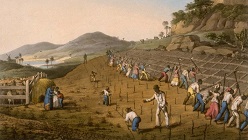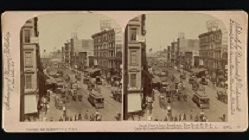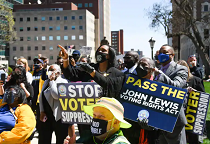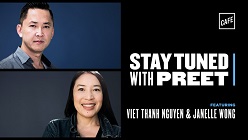By Jessica Weiss ’05
The National Endowment for the Humanities has awarded grants to projects involving two University of Maryland historians to expand a massive digital database on the transatlantic slave trade and investigating the desegregation of mass transit in New York City.
Department of History Professors Daryle Williams and Richard Bell are benefitting from $24 million given last month to support 225 projects at museums, libraries, universities and historic sites across the country.
Williams is part of the multi-institutional team awarded $349,744 to add 10 digital collections to Enslaved: Peoples of the Historical Slave Trade (Enslaved.org), an online portal launched last year with records on hundreds of thousands of individuals involved in the historical slave trade.
Among the new collections are records from the Maryland State Archives’ Legacy of Slavery in Maryland project, which includes primary resources like newspaper ads, committal notices and census records related to Black Marylanders, fugitives and those who assisted slaves on the run in the state. Researchers will work to integrate those records into the Enslaved.org platform, where they can be used by scholars, family historians and the general public.
“This is a great opportunity to know more about slavery right here in Maryland—to know more about ourselves,” said Williams, who is a co-principal investigator at Enslaved.org. “We can’t understand the history of the state without talking about the impact of enslavement here. And these are really rich materials to do that.”
Other additional data sets, which range from those held at small, local institutions to those at large, university-based special collections in the mid-Atlantic, the Carolinas and the Lower Mississippi, will increase the Enslaved.org linked open data platform to approximately 1.3 million records.
The funding will also go in part toward supporting undergraduate researchers who will work on the project as part of the Summer Research Opportunity Program, a long-standing pipeline collaboration among member institutions of the Big Ten Academic Alliance.
Another $6,000 will support Bell as he works on his next book, “The First Freedom Riders: Streetcars and Street Fights in Jim Crow New York.” It will tell the story of Elizabeth Jennings, a 25-year-old New Yorker who launched the first successful civil disobedience campaign in U.S. history. On July 16, 1854, Jennings stepped onto a ‘whites-only’ streetcar on Third Avenue, becoming the first among a small army of young Black women and men to fight to forcibly desegregate mass transit in New York City.
“Her story got under my skin—not only because it was dramatic and significant, but also because it reminds me that Black women have often been at the center of this country’s most important civil rights fights,” Bell said.
Recently named a 2021 Andrew Carnegie Fellow by the Carnegie Corporation of New York to support his work on the book, Bell will use the new NEH funds to travel to out-of-state archives for research.
“I’m eager to get back into the stacks and reading rooms, where the true riches for a project like this definitely rest,” he said.
----
The Andrew W. Mellon Foundation has awarded $1.4 million to fund the third phase of Enslaved.org, which will refine the site’s data infrastructure, ensure a dedicated team and continue partnerships with scholars, heritage and cultural organizations and the public.
The Mellon Foundation funded the initial two phases of Enslaved.org—the first beginning in 2018 and the second in 2020—which provided support for both proof-of-concept and implementation. Phase II also saw the launch of the project’s peer-reviewed Journal of Slavery & Data Preservation.
This new round of funding is the latest in a long series of Mellon investments into research projects at the University of Maryland or involving Maryland researchers.
Among them, the foundation has provided over $3 million since 2016 to fund the African American Digital Humanities initiative at Maryland, and a recently announced $4.8 million grant will fund the Digital Inquiry, Speculation, Collaboration, & Optimism (DISCO) network, which includes UMD Assistant Professor of Communication Catherine Knight Steele.






 By
By 







